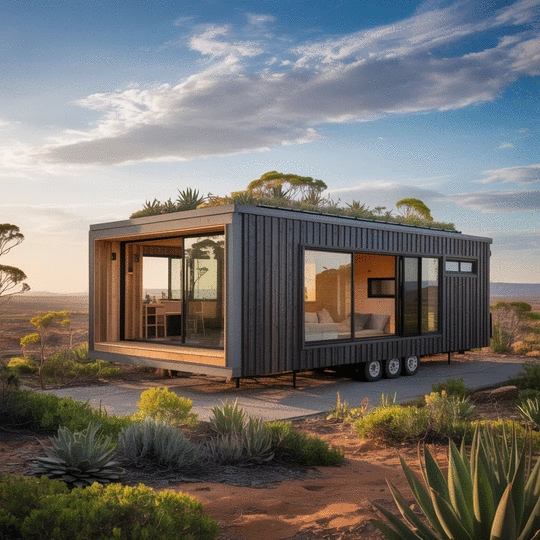Zoning Laws for Sustainable Living
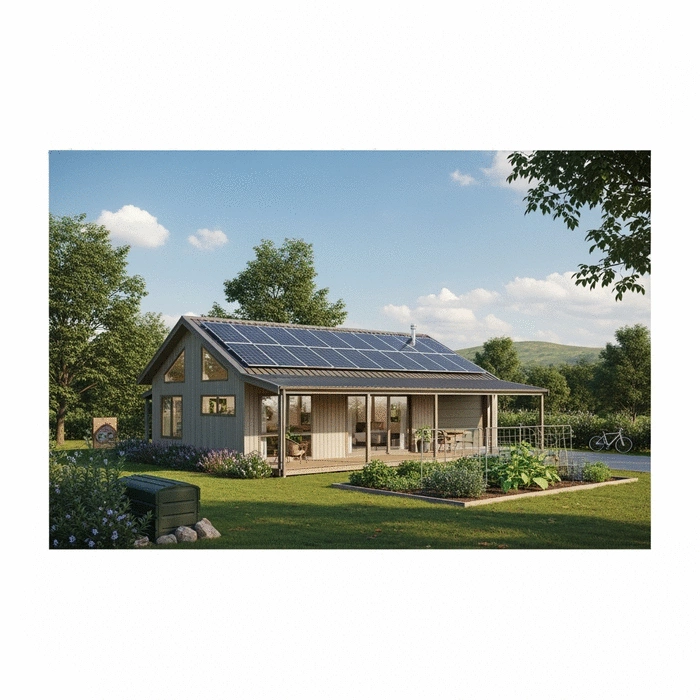
Posted on: 2025-10-29
By: Sophie Marchant
Did you know that zoning laws can significantly impact the feasibility of sustainable housing initiatives? Understanding these regulations is crucial for anyone interested in creating eco-friendly communities. The right zoning can either facilitate innovative housing solutions or hinder them. Here are the key takeaways that will empower you to navigate zoning regulations effectively.
What You Will Learn
- Zoning laws dictate land use, directly influencing where and how sustainable homes can be built.
- Understanding zoning promotes orderly community development while minimizing environmental impacts.
- Knowledge of zoning regulations empowers you to advocate for changes that support sustainable living initiatives.
- Community engagement is crucial; attending local meetings can foster dialogue about sustainable housing options.
- Local government agencies, such as planning departments and zoning boards, play essential roles in shaping zoning laws.
- Researching local laws and connecting with advocacy groups can help streamline the process of navigating zoning regulations.
The Role of Zoning Regulations in Sustainable Housing Initiatives
Understanding zoning regulations is essential for navigating sustainable housing efforts. Below is a visual breakdown of how zoning laws influence sustainable development. For more detailed information on specific regulations, you might want to explore our guide on tiny house zoning laws explained.
Promote Smart Growth
Zoning laws encourage higher density living and reduce urban sprawl.
Ensure Safety
Maintain safety standards in construction, vital for eco-friendly structures.
Protect Natural Resources
Prevent development on sensitive ecological areas, preserving natural habitats.
Limiting Housing Types
Some regulations may restrict innovative housing designs, limiting options for sustainable living.
Encouraging Energy Efficiency
Zoning can require energy-efficient designs, promoting the use of renewable resources.
Supporting Community Projects
Zoning can facilitate the development of community gardens or parks that encourage sustainability.
Understanding the Framework of Zoning Regulations for Sustainable Homes
When diving into the world of tiny homes or sustainable living, it's essential to understand the framework of zoning regulations. Zoning laws dictate how land can be used in different areas, impacting everything from residential spaces to commercial developments. At The Tiny Living Guide, I’ve seen how these regulations not only govern where we can build but also shape the landscape of sustainable development.
These laws play a crucial role in ensuring that the communities we create are safe, accessible, and aligned with environmental goals. They manage the density of buildings, set guidelines for construction, and often dictate the types of materials that can or cannot be used. By understanding zoning regulations, we can better navigate the challenges of building sustainable homes that fit within these frameworks.
Defining Zoning Laws and Their Importance in Sustainable Development
Zoning laws are legal frameworks that categorize land based on its intended use. They can include categories like residential, commercial, and agricultural. The importance of these laws in sustainable development cannot be overstated—they help promote orderly growth while minimizing negative impacts on the environment.
When it comes to sustainable living, zoning laws can facilitate efforts to build eco-friendly homes and communities. Here are some key reasons why they matter:
- Promote Smart Growth: Zoning laws can encourage higher density living and reduce urban sprawl.
- Ensure Safety: They help maintain safety standards in construction, which is vital for eco-friendly structures.
- Protect Natural Resources: Zoning can prevent development on sensitive ecological areas, preserving natural habitats.
How Zoning Regulations Impact Sustainable Housing Initiatives
Zoning regulations greatly influence sustainable housing initiatives by setting the stage for what is permissible in a community. They can either support or hinder creative approaches to eco-friendly living. For instance, in areas with strict zoning codes, it may be challenging to introduce tiny homes or alternative building methods that emphasize sustainability.
Here are several ways zoning regulations impact sustainable housing:
- Limiting Housing Types: Some regulations may restrict innovative housing designs, limiting options for sustainable living.
- Encouraging Energy Efficiency: Zoning can require energy-efficient designs, promoting the use of renewable resources.
- Supporting Community Projects: Zoning can facilitate the development of community gardens or parks that encourage sustainability.
Ultimately, understanding these regulations allows individuals like you and me to advocate for changes that support sustainable initiatives in our communities. As we explore the potential of tiny homes, let's remember how pivotal zoning laws are in shaping our living environments! Together, we can work towards a future that embraces both sustainability and community development. For those interested in innovative designs, exploring space-saving tiny house designs can provide valuable insights.
Pro Tip
Did you know? Engaging with local zoning boards and planning departments is one of the most effective ways to advocate for sustainable housing initiatives in your community. By attending public meetings and expressing your ideas, you can influence decision-making processes and help shape regulations that promote eco-friendly living.
Summarizing Key Insights on Navigating Zoning Laws for Sustainable Homes
Recap of the Importance of Understanding Zoning Laws for Sustainable Development
Understanding zoning laws is crucial for anyone interested in sustainable development, especially in the realm of tiny homes. These regulations guide how land can be used, helping to shape our communities and environments. By grasping the zoning framework, we empower ourselves to navigate the complexities of building and living sustainably.
When we look at the tiny house movement, it’s evident that zoning laws can either facilitate or hinder progress. Having a solid understanding of these laws can help you advocate for changes that support sustainable living. This knowledge can lead to exciting opportunities for growing communities that prioritize eco-friendly practices.
- Zoning laws dictate land use: They influence where and how sustainable homes can be built.
- They impact community development: Understanding these laws helps us shape our neighborhoods.
- Knowledge leads to advocacy: Being informed allows you to push for better regulations in your area.
Final Thoughts on the Role of Zoning Reform in Promoting Sustainable Housing
As I reflect on the journey of sustainable housing, it's clear that zoning reform plays a pivotal role in this movement. By adapting existing laws, we can create spaces that encourage eco-friendly living while ensuring that everyone has a place to call home. This reform can lead to innovative designs and sustainable practices that directly benefit our environment.
In my experience at The Tiny Living Guide, I’ve seen the incredible potential that emerges when communities come together to advocate for zoning changes. It’s not just about building homes; it’s about fostering a culture that values sustainability and supports one another in the journey towards simpler living. With the right zoning reforms, we can make tiny homes a viable option for many more people. For insights into making tiny homes viable, consider reading about financing your tiny house purchase.
Encouraging Action and Further Exploration
Steps for Homeowners and Developers to Navigate Zoning Processes Effectively
Navigating zoning processes can seem overwhelming, but with a few strategic steps, it can be manageable. Whether you’re a homeowner or a developer, these tips can help you effectively engage with zoning regulations:
- Research local laws: Understand the specific zoning laws in your area to identify opportunities and restrictions.
- Connect with local advocacy groups: Join organizations that promote sustainable housing to gain support and resources.
- Attend community meetings: Engage with local government officials and share your ideas on sustainable housing.
- Prepare your proposals: Ensure that your building plans are aligned with zoning regulations to streamline the approval process.
Resources for Staying Updated on Zoning Laws and Sustainability Practices
Staying informed about zoning laws and sustainability practices is essential for anyone involved in the tiny home movement. Here are some valuable resources to help you keep track:
- Local government websites: Regularly check for updates on zoning regulations and public meetings.
- Sustainable living blogs: Follow platforms like The Tiny Living Guide for insights and advice.
- Social media groups: Join online communities focused on tiny homes and sustainable living to share experiences and knowledge.
Understanding the Role of Local Government Agencies in Zoning
Local government agencies play a significant role in the zoning process, and understanding their functions can help you navigate the system more effectively. Here’s what you need to know:
- Planning departments: They oversee the development and implementation of zoning regulations.
- Zoning boards: These panels review applications and provide recommendations for zoning changes.
- Community development offices: They often assist in facilitating community engagement and public input in zoning decisions.
By familiarizing yourself with these agencies, you can better engage in the zoning process and advocate for sustainable housing initiatives that align with your vision for a greener future. Let's continue to explore these possibilities together! What steps will you take to navigate zoning laws in your community? For more general information on sustainable housing, our related article provides additional context and solutions.
Recap of Key Points
Here is a quick recap of the important points discussed in the article:
- Zoning laws dictate land use: They influence where and how sustainable homes can be built, impacting community development.
- Regulations promote smart growth: Proper zoning can encourage higher density living, reducing urban sprawl and protecting natural resources.
- Understanding zoning helps advocacy: Knowledge of local laws empowers individuals to push for better regulations that support sustainable living.
- Engagement with local authorities: Attending community meetings and connecting with advocacy groups can help facilitate sustainable housing initiatives.
- Staying informed: Follow local government updates and sustainable living resources to remain aware of zoning changes and best practices.
Frequently Asked Questions About Zoning Laws and Sustainable Housing
- Q: What role do zoning laws play in sustainable housing?
- A: Zoning laws dictate how land can be used, directly influencing where sustainable homes can be built and what types of eco-friendly construction are permitted. They can either facilitate or hinder innovative housing solutions.
- Q: How can zoning regulations promote sustainable development?
- A: Zoning laws can promote smart growth by encouraging higher density living, reducing urban sprawl, and protecting natural resources. They can also require energy-efficient designs and facilitate community projects like gardens.
- Q: What are the challenges posed by zoning laws for sustainable housing?
- A: Some zoning regulations may restrict innovative housing designs, such as tiny homes or alternative building methods, thereby limiting options for sustainable living.
- Q: How can individuals advocate for changes in zoning laws to support sustainable housing?
- A: Individuals can research local laws, connect with local advocacy groups, attend community meetings, and prepare proposals aligned with zoning regulations to advocate for changes that support sustainable initiatives.
- Q: Which local government agencies are involved in shaping zoning laws?
- A: Planning departments oversee the development and implementation of zoning regulations, zoning boards review applications and make recommendations, and community development offices assist in public input and engagement.
- Q: Where can I find resources to stay updated on zoning laws and sustainability practices?
- A: You can check local government websites for updates, follow sustainable living blogs like The Tiny Living Guide, and join online communities focused on tiny homes and sustainable living.
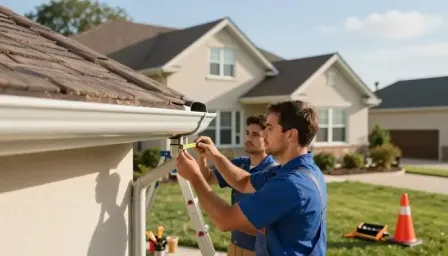 Getting your gutter installation right is key to keeping your home safe from water damage. A good gu
Getting your gutter installation right is key to keeping your home safe from water damage. A good gu
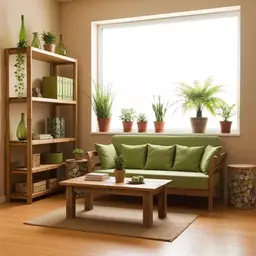 What if your small living space could also be a sanctuary for the planet? Embracing sustainability n
What if your small living space could also be a sanctuary for the planet? Embracing sustainability n
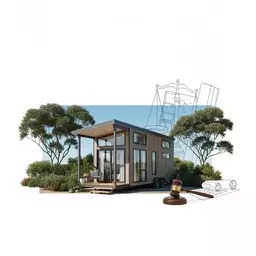 As the tiny home movement gains momentum in Australia, the legal landscape can feel daunting. Howeve
As the tiny home movement gains momentum in Australia, the legal landscape can feel daunting. Howeve
